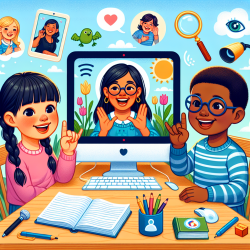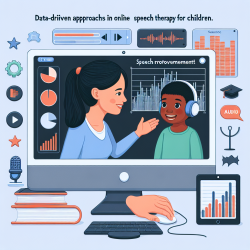Introduction
In the ever-evolving landscape of speech-language pathology and online therapy, understanding patient perspectives across different cultures is crucial for developing effective interventions. The research article "A Promising Method for Identifying Cross-Cultural Differences in Patient Perspective: The Use of Internet-Based Focus Groups for Content Validation of New Patient Reported Outcome Assessments" offers valuable insights into leveraging technology for this purpose. This blog explores how practitioners can apply these findings to enhance their skills and outcomes for children in diverse cultural settings.
Understanding Internet-Based Focus Groups (IFGs)
Internet-based focus groups (IFGs) are a novel approach to gathering qualitative data from participants across different geographical locations. Unlike traditional face-to-face focus groups, IFGs overcome geographical and physical barriers, allowing for a more diverse participant pool. This method is particularly beneficial in speech-language pathology, where cultural nuances can significantly impact therapy outcomes.
Key Findings from the Research
The study conducted by Atkinson et al. (2006) demonstrated the effectiveness of IFGs in identifying cross-cultural differences in patient perspectives. By analyzing thematic content from focus group transcripts, researchers were able to identify major themes and explore potential cultural differences. This approach not only provided a cost-effective and time-efficient method for content validation but also highlighted the importance of culturally sensitive questionnaire content.
Applying the Findings in Practice
For practitioners in speech-language pathology, incorporating the insights from this research can enhance the cultural sensitivity of interventions. Here are some practical steps:
- Utilize IFGs: Consider using IFGs to gather insights from diverse cultural groups. This approach can help identify unique cultural perspectives that may influence therapy outcomes.
- Develop Culturally Sensitive Materials: Use the thematic coding methodology to develop materials that reflect the natural language and cultural nuances of participants.
- Engage in Continuous Learning: Stay informed about new research and methodologies in cross-cultural content validation to continuously improve your practice.
Encouraging Further Research
While the findings from this study are promising, there is a need for further research to explore the application of IFGs in different cultural contexts and therapy settings. Practitioners are encouraged to contribute to this growing body of knowledge by conducting their own studies and sharing their findings with the community.
Conclusion
The use of internet-based focus groups for cross-cultural content validation offers a promising avenue for enhancing patient-reported outcome measures in speech-language pathology. By embracing this methodology, practitioners can develop more culturally sensitive interventions, ultimately leading to better outcomes for children in diverse cultural settings.
To read the original research paper, please follow this link: A promising method for identifying cross-cultural differences in patient perspective: the use of Internet-based focus groups for content validation of new Patient Reported Outcome assessments.










